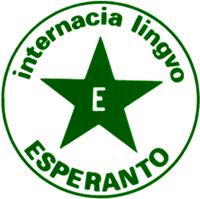 Esperanto isn’t a language I talk about much, perhaps because it isn’t very well known among the general populace of the world, and perhaps because I haven’t had much occasion to speak it. But I have been learning it for more than a year now, and a couple of evenings ago I finally got to talk to some real live Esperantists in London.
Esperanto isn’t a language I talk about much, perhaps because it isn’t very well known among the general populace of the world, and perhaps because I haven’t had much occasion to speak it. But I have been learning it for more than a year now, and a couple of evenings ago I finally got to talk to some real live Esperantists in London.
They were very kind, and patient as I got into the groove of listening to and speaking Esperanto. I could understand better as we went along, and although I sometimes didn’t know a certain word, I was able to carry on a very reasonable conversation despite my occasional grammatical slip-ups.
One thing I found interesting about speaking other languages is how, even if I know the correct words for the language, it takes me a while to accustom myself to using them. For example, when I first arrived in Belgium and started speaking French, I found myself saying sí instead of oui, I suppose due to the fact that up to that point, anytime I wasn’t speaking English, I was speaking Spanish. And when I was speaking Esperanto the other night, starting out I kept unintentionally saying oui instead of jes! But if that is the greatest of my troubles, I’m doing pretty well.
To finish up this circuitous blog post, I just want to throw out an advertisement for Esperanto itself. I believe that the fact that I was able to speak it well the other night with so little previous practice shows how easy Esperanto is to learn. Stripped of the irregularities that frequent natural languages, Esperanto is very simple to learn, and once learnt, one can learn other languages more easily. Plus, Esperanto speakers tend to be very nice folks, and they may be found all over the world!
What a good post! Esperanto works! I’ve used it in speech and writing in about fifteen countries over recent years.
Indeed, the language has some remarkable practical benefits. Personally, I’ve made friends around the world through Esperanto that I would never have been able to communicate with otherwise. And then there’s the Pasporta Servo, which provides free lodging and local information to Esperanto-speaking travellers in over 90 countries. Over recent years I have had guided tours of Berlin, Douala and Milan in the planned language. I have discussed philosophy with a Slovene poet, humour on television with a Bulgarian TV producer. I’ve discussed what life was like in East Berlin before the wall came down, how to cook perfect spaghetti, the advantages and disadvantages of monarchy, and so on. I recommend it, not just as an ideal but as a very practical way to overcome language barriers.
Gratulon pro via sukcesa lernado.